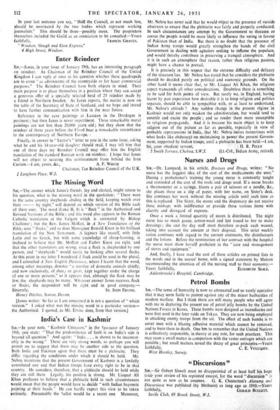India's Case in Kashmir
SIR.—In your note, " Kashmir Unreason," in the Spectator of January 19th, you state: "That the predominance of fault is on India's side is beyond all question." And again: " India ... is shown to be incontest- ably in the wrong." These are very strong words, so perhaps you will permit me to suggest that there may be another side to the question. Both India and Pakistan agree that there must be a plebiscite. They differ regardii.g the conditions under which it should be held. Mr. Nehru maintains that the present Government of Kashmir is a lawfully constituted one and that Indian troops have every right to be in that country. He considers, therefore, that a plebiscite should be held while they arc still there. Legally, his position is strong. Mr. Liaquat All Khan professes to believe that a plebiscite held in such circumstances would mean that the people would have to decide "with Indian bayonets pointing at their heads." He can hardly expect this view to be taken seriously. Presumably the ',allot would be a secret one. Moreover, Mr. Nehru has never said that he would object to the presence of outside observers to ensure that the plebiscite was fairly and properly conducted. In such circumstances any attempt by the Government to threaten or coerce the people would be more likely to influence the voting in favour of Pakistan than of India. But there is no doubt that the presence of
Indian Army troops would greatly strengthen the hands of the civil Government in dealing with agitators seeking to inflame the populace, and would thereby contribute in preserving a tranquil atmosphere. And it is in such an atmosphere that reason, rather than religious passion, might have a chance to prevail.
It is precisely in this respect that the extreme difficulty and delicacy of the situation lies. Mr Nehru has stated that he considers the plebiscite should be decided purely on political and economic grounds. On the other hand it seems clear that, to Mr. Liaquat All Khan, the religious aspect transcends all other considerations. Doubtless there is something to be said for both points of view. But surely we, in England, having learnt by past experience how desirable it is to keep religion and politics separate, should be able to sympathise with, or at least to understand, Mr. Nehru's attitude ? Any sudden change in the present regime in Kashmir would not only weaken the administration, but would tend to unsettle and excite the people ; and so render them more susceptible to religious propaganda. And it is because his main object is to keep religion out of the picture as far as possible, especially in view of probable repercussions in .India, that Mr. Nehru-insists (sometimes with what looks like obduracy).on maintaining in power the present Govern- ment, supported by Indian troops, until a plebiscite has been held.—I am, 5 Smith Terrace, Chelsed, S.W .3. (Lt.-Col., Indian Army, retired).






































 Previous page
Previous page